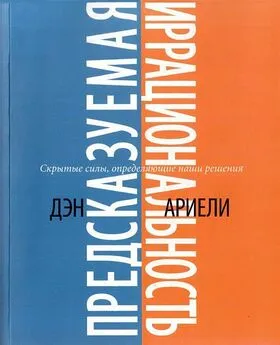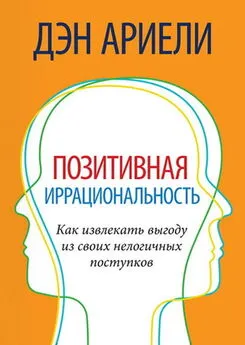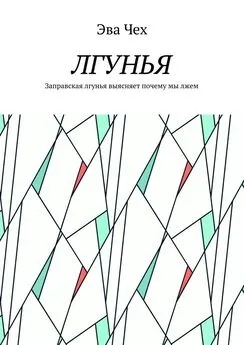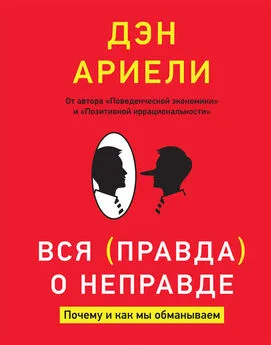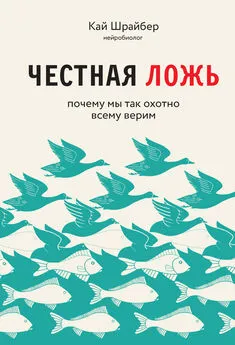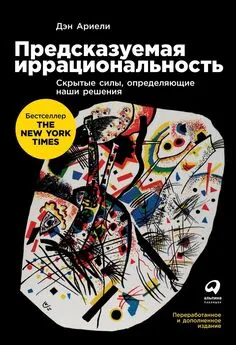Дэн Ариели - Честно о нечестности. Почему мы лжем всем и особенно себе
- Название:Честно о нечестности. Почему мы лжем всем и особенно себе
- Автор:
- Жанр:
- Издательство:Альпина Паблишер
- Год:2020
- Город:Москва
- ISBN:978-5-9614-3139-1
- Рейтинг:
- Избранное:Добавить в избранное
-
Отзывы:
-
Ваша оценка:
Дэн Ариели - Честно о нечестности. Почему мы лжем всем и особенно себе краткое содержание
Новая книга Дэна Ариели, автора бестселлера «Предсказуемая иррациональность», посвящена нечестности. Он исследует мотивы, заставляющие людей мошенничать, и помогает понять, что делает нас нечестными.
Научные выводы на основе психологических экспериментов автора помогут изменить ваше восприятие как собственных действий и поступков, так и окружающих вас людей. Также вы узнаете о способах, позволяющих сделать поведение людей более честным — как в личной, так и в корпоративной жизни.
Книга также выходила под названием «Вся правда о неправде».
Честно о нечестности. Почему мы лжем всем и особенно себе - читать онлайн бесплатно ознакомительный отрывок
Интервал:
Закладка:
Джером Д. Трое в лодке, не считая собаки. — М.: АСТ, 2017.
Jeff Kreisler, Get Rich Cheating: The Crooked Path to Easy Street (New York: HarperCollins, 2009).
Eynav Maharabani, «Honesty and Helping Behavior: Testing Situations Involving Temptation to Cheat a Blind Person», master’s thesis, Ben-Gurion University of the Negev, Israel (2007).
Nina Mazar, On Amir, Dan Ariely, «The Dishonesty of Honest People: A Theory of Self-concept Maintenance», Journal of Marketing Research (2008).
Nina Mazar, Dan Ariely, «Dishonesty in Everyday Life and Its Policy Implications», Journal of Public Policy and Marketing (2006).
Библиография
Nina Mazar, On Amir, Dan Ariely, «The Dishonesty of Honest People: A Theory of Self-concept Maintenance», Journal of Marketing Research (2008).
Lisa Shu, Nina Mazar, Francesca Gino, Max Bazerman, Dan Ariely, «When to Sign on the Dotted Line? Signing First Makes Ethics Salient and Decreases Dishonest Self-Reports», working paper, Harvard Business School NOM Unit (2011).
Дополнительные источники
Jason Dana, Roberto A. Weber, and Jason Xi Kuang, «Exploiting Moral Wiggle Room: Behavior Inconsistent with a Preference for Fair Outcomes», Economic Theory (2007).
Christopher K. Hsee, «Elastic Justification: How Tempting but Task-Irrelevant Factors Influence Decisions», Organizational Behavior and Human Decision Processes (1995).
Christopher K. Hsee, «Elastic Justification: How Unjustifiable Factors Influence Judgments», Organizational Behavior and Human Decision Processes (1996).
Maurice Schweitzer and Chris Hsee, «Stretching the Truth: Elastic Justification and Motivated Communication of Uncertain Information», The Journal of Risk and Uncertainty (2002).
Дополнительные источники
Robert L. Goldstone and Calvin Chin, «Dishonesty in Self-report of Copies Made — Moral Relativity and the Copy Machine», Basic and Applied Social Psychology (1993).
Robert A. Wicklund, «The Influence of Self-awareness on Human Behavior», American Scientist (1979).
Библиография
Daylian M. Cain, George Loewenstein, and Don A. Moore, «The Dirt on Coming Clean: The Perverse Effects of Disclosing Conflicts of Interest», Journal of Legal Studies (2005).
Ann Harvey, Ulrich Kirk, George H. Denfield, and P. Read Montague, «Monetary Favors and Their Influence on Neural Responses and Revealed Preference», The Journal of Neuroscience (2010).
Дополнительные источники
James Bader and Daniel Shugars, «Agreement Among Dentists’ Recommendations for Restorative Treatment», Journal of Dental Research (1993).
Max H. Bazerman and George Loewenstein, «Taking the Bias Out of Bean Counting», Harvard Business Review (2001).
Max H. Bazerman, George Loewenstein, and Don A. Moore, «Why Good Accountants Do Bad Audits: The Real Problem Isn’t Conscious Corruption. It’s Unconscious Bias», Harvard Business Review (2002).
Daylian M. Cain, George Loewenstein, and Don A. Moore, «When Sunlight Fails to Disinfect: Understanding the Perverse Effects of Disclosing Conflicts of Interest», Journal of Consumer Research (in press).
Carl Elliot, White Coat, Black Hat: Adventures on the Dark Side of Medicine (Boston: Beacon Press, 2010).
Библиография
Mike Adams, «The Dead Grandmother/Exam Syndrome and the Potential Downfall of American Society», The Connecticut Review (1990).
Shai Danziger, Jonathan Levav, and Liora Avnaim-Pesso, «Extraneous Factors in Judicial Decisions», Proceedings of the National Academy of Sciences of the United States of America (2011).
Nicole L. Mead, Roy F. Baumeister, Francesca Gino, Maurice E. Schweitzer, and Dan Ariely, «Too Tired to Tell the Truth: Self-Control Resource Depletion and Dishonesty», Journal of Experimental Social Psychology (2009).
Emre Ozdenoren, Stephen W. Salant, and Dan Silverman, «Willpower and the Optimal Control of Visceral Urges», Journal of the European Economic Association (2011).
Baba Shiv and Alexander Fedorikhin, «Heart and Mind in Conflict: The Interplay of Affect and Cognition in Consumer Decision Making», The Journal of Consumer Research (1999).
Дополнительные источники
Roy F. Baumeister and John Tierney, Willpower: Rediscovering the Greatest Human Strength (New York: The Penguin Press, 2011).
Roy F. Baumeister, Kathleen D. Vohs, and Dianne M. Tice, «The Strength Model of Self-control», Current Directions in Psychological Science (2007).
Francesca Gino, Maurice E. Schweitzer, Nicole L. Mead, and Dan Ariely, «Unable to Resist Temptation: How Self-Control Depletion Promotes Unethical Behavior», Organizational Behavior and Human Decision Processes (2011).
C. Peter Herman and Janet Polivy, «A Boundary Model for the Regulation of Eating», Research Publications — Association for Research in Nervous and Mental Disease (1984).
Walter Mischel and Ozlem Ayduk, «Willpower in a Cognitive-Affective Processing System: The Dynamics of Delay of Gratification» in Hand-book of Self-regulation: Research, Theory, and Applications, edited by Kathleen D. Vohs, Roy F. Baumeister (New York: Guilford, 2011).
Janet Polivy, C. Peter Herman, «Dieting and Binging, A Causal Analysis», American Psychologist (1985).
Библиография
Francesca Gino, Michael I. Norton, and Dan Ariely, «The Counterfeit Self: The Deceptive Costs of Faking It», Psychological Science (2010).
Дополнительные источники
Dan Ariely and Michael L. Norton, «How Actions Create — Not Just Reveal — Preferences», Trends in Cognitive Sciences (2008).
Roy F. Baumeister, Kathleen D. Vohs, and Dianne M. Tice, «The Strength Model of Self-control», Current Directions in Psychological Science (2007).
C. Peter Herman and Deborah Mack, «Restrained and Unrestrained Eating», Journal of Personality (1975).
Библиография
Zoe Chance, Michael I. Norton, Francesca Gino, and Dan Ariely, «A Temporal View of the Costs and Benefits of Self-Deception», Proceedings of the National Academy of Sciences (2011).
Дополнительные источники
Ziva Kunda, «The Case for Motivated Reasoning», Psychological Bulletin (1990).
Danica Mijovicґ-Prelec and Dražen Prelec, «Self-deception as Self-Signalling: A Model and Experimental Evidence», Philosophical Transactions of the Royal Society (2010).
Robert Trivers, «The Elements of a Scientific Theory of Self-Deception», Annals of the New York Academy of Sciences (2000).
Библиография
Edward J. Balleisen, «Suckers, Swindlers, and an Ambivalent State: A History of Business Fraud in America», manuscript.
Shane Frederick, «Cognitive Reflection and Decision Making», Journal of Economic Perspectives (2005).
Michael S. Gazzaniga, «Consciousness and the Cerebral Hemispheres», in The Cognitive Neurosciences, edited by Michael S. Gazzaniga (Cambridge, Mass.: MIT Press, 1995).
Francesca Gino and Dan Ariely, «The Dark Side of Creativity: Original Thinkers Can Be More Dishonest», Journal of Personality and Social Psychology (2011).
Ayelet Gneezy and Dan Ariely, «Don’t Get Mad, Get Even: On Consumers’ Revenge», working paper, Duke University (2010).
Richard Nisbett and Timothy DeCamp Wilson, «Telling More Than We Can Know: Verbal Reports on Mental Processes», Psychological Review (1977).
Yaling Yang, Adrian Raine, Todd Lencz, Susan Bihrle, Lori Lacasse, and Patrick Colletti, «Prefrontal White Matter in Pathological Liars», The British Journal of Psychiatry (2005).
Дополнительные источники
Jesse Preston and Daniel M. Wegner, «The Eureka Error: Inadvertent Plagiarism by Misattributions of Effort», Journal of Personality and Social Psychology (2007).
Библиография
Nicholas A. Christakis and James H. Fowler, Connected: The Surprising Power of Our Social Networks and How They Shape Our Lives (New York: Little, Brown, 2009).
Чалдини Р. Психология влияния: Как научиться убеждать и добиваться успеха. — М.: Эксмо, 2012.
Francesca Gino, Shahar Ayal, and Dan Ariely, «Contagion and Differentiation in Unethical Behavior: The Effect of One Bad Apple on the Barrel», Psychological Science (2009).
George L. Kelling and James Q. Wilson, «Broken Windows: The Police and Neighborhood Safety», The Atlantic (March 1982).
Nina Mazar, Kristina Shampanier, and Dan Ariely, «Probabilistic Price Promotions — When Retailing and Las Vegas Meet», working paper, Rotman School of Management, University of Toronto (2011).
Дополнительные источники
Ido Erev, Paul Ingram, Ornit Raz, and Dror Shany, «Continuous Punishment and the Potential of Gentle Rule Enforcement», Behavioural Processes (2010).
Библиография
Melissa Bateson, Daniel Nettle, and Gilbert Roberts, «Cues of Being Watched Enhance Cooperation in a Real-World Setting», Biology Letters (2006).
Francesca Gino, Shahar Ayal, and Dan Ariely, «Out of Sight, Ethically Fine? The Effects of Collaborative Work on Individuals’ Dishonesty», working paper (2009).
Janet Schwartz, Mary Frances Luce, and Dan Ariely, «Are Consumers Too Trusting? The Effects of Relationships with Expert Advisers», Journal of Marketing Research (2011).
Дополнительные источники
Francesca Gino and Lamar Pierce, «Dishonesty in the Name of Equity», Psychological Science (2009).
Uri Gneezy, «Deception: The Role of Consequences», American Economic Review (2005).
Nina Mazar and Pankaj Aggarwal, «Greasing the Palm: Can Collectivism Promote Bribery?» Psychological Science (2011).
Scott S. Wiltermuth, «Cheating More When the Spoils Are Split», Organizational Behavior and Human Decision Processes (2011).
Библиография
Rachel Barkan, Dan Ariely, «Worse and Worst: Daily Dishonesty of Businessmen and Politicians», working paper, Ben-Gurion University of the Negev, Israel (2008).
Yoel Inbar, David Pizarro, Thomas Gilovich, Dan Ariely, «Moral Masochism: Guilt Causes Physical Self-punishment», working paper (2009).
Azim Shariff, Ara Norenzayan, «Mean Gods Make Good People: Different Views of God Predict Cheating Behavior», International Journal for the Psychology of Religion (2011).
Читать дальшеИнтервал:
Закладка:


